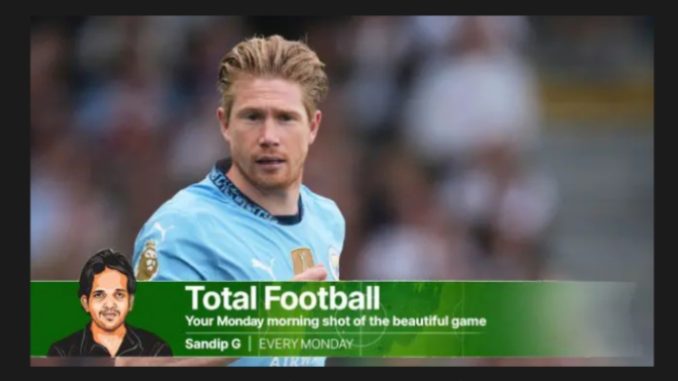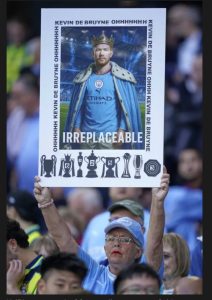
Kevin de Bruyne – the uncelebrated Messi of the under-appreciated golden era of Manchester City
Kevin de Bruyne – the uncelebrated Messi of the under-appreciated golden era of Manchester City
Kevin de Bruyne saw the pass that no one could see or imagine, and one after its execution, no one could believe.
de Bruyne ould conjure the magical too, the curlers and benders that wickedly hooped around the corners, the supersonic thunderbolts from the distance, the pace not diluting the precision. (AP)
de Bruyne ould conjure the magical too, the curlers and benders that wickedly hooped around the corners, the supersonic thunderbolts from the distance, the pace not diluting the precision. (AP)
Five minutes remained on the clock when the fourth official raised the digital substitution board. It flashed No 17. A wave of applause erupted in Craven Cottage, the home ground of Fulham, as Kevin de Bruyne, his crown of golden hair flapping in the West London breeze, glided onto the pitch. For the one last time in the sky blue shirt of Manchester City.
By then, there was no task left for him to perform on the day. Manchester City had extracted a 2-0 lead and secured a spot in next season’s Champions League. There was no rolling the clock, a farewell trick or a tribute. Perhaps, it was the finest tribute his colleagues could offer him. To simply enjoy the last five minutes of his glorious career, soak in the light of his deeds. There was nearly a throwback moment when he almost slid a pass from the instep of his right boot and found Phil Foden but for a defender’s flailing leg. De Bruyne smiled wryly. It was not quite his evening. But there were hundreds of others, afternoons, evenings and nights, he could call his own.
The history of Manchester City’s greatest era is the biography of two great men. Pep Guardiola and de Bruyne. The creator and the conduit. The soul and the heart. When de Bruyne hit the high notes, he was a rhapsody, strumming the perfect beat with his feet. He was no routine passer who performed to practised tunes. But mastered the toughest metre in football orchestra—to see the pass that no one sees. He, like the great pass-metronome Xavi, could also see the pass no one else imagined, or after its execution, no one else believed.
The responses of crestfallen defenders were not marvelling at a piece of unstoppable genius, but a sense of shock as to how the space existed, sort of a phantom space. It was right there, right here, yet no one saw. Often, the pass was a gentle roll along the ground, the ball not bending and bursting but whistling through a straight line, through a cavalcade of frozen impulses.
The work of a genius operating on the outer reaches of imagination, intelligence and a perception of space and time. He could conjure the magical too, the curlers and benders that wickedly hooped around the corners, the supersonic thunderbolts from the distance, the pace not diluting the precision. He created, scored, disrupted and defended, making him one of the most difficult players to classify in the conventional sense. He was a midfielder. Or was he? He was a right-sided forward, but was he? Was he an 8 or 10? He wore No 17, a figure that breaks conventional number-role correlation.
Manchester City’s Kevin De Bruyne waves to supporters after his final home game. (AP Photo/Dave Thompson)
It captures the fascinating ambiguity of his positions because he could straddle various roles, and roles within roles that Guardiola loves to create. Guardiola’s predecessor Manuel Pelligrini deployed him as a left-sided midfield attacker or at the centre as a more conventional playmaking 10. Guardiola primarily utilised him as one of twin free No 8s, with the equally intelligent David Silva. The pair was play-making, but in a deeper role, just in front of the defensive midfielder in a high line.
The Spaniard’s departure repurposed him into something of an extinct inside right, a realm from where he pulled the strings of the most dominant side in England in the last decade. It was his most fruitful period as both creator and goalscorer, and the golden period of Guardiola, winning four league titles on the spin, realising the European dream and achieving the treble. And de Bruyne was the golden boy.
His shapeshifting expertise complicated the lives of defenders and markers because it was hard to define exactly where he was playing, which meant it was not clear whose job it was to neuter him. To borrow from cricket lexicon, he operated in the corridor of uncertainty, in half spaces.
Story continues below this ad
As Guardiola calibrated and recalibrated his systems and structures, so did de Bruyne, blending seamlessly into positional swaps. The manager would employ him as False 9, wide man, deep man. He excelled in every role. “I have always changed positions and I don’t expect any different. It’s all the same to me. It’s all about the way you interpret it,” he once said.
Perhaps, this is how great footballers perceive the game, without the shackles of roles and spaces, regimented structures and refined systems. Football as an instinct. Two-footedness, a rare band in itself, helped. So exemplary that he once racked a hat-trick with his weaker foot, the left leg, against Wolverhampton Wolves in 2022. It helped even more that his brains processed the patterns on the field faster than those around him—the path of the ball, the weight on it, the curl and drop. He could combine sophistry with power and pace too.
KdB’s moment of farewell was graceful too, leaving the stage before he became a burden to the club.
KdB’s moment of farewell was graceful too, leaving the stage before he became a burden to the club. (AP)
In his valediction at Etihad, Guardiola hailed him as the second best passer he has managed, after Lionel Messi. There was no sense of immediacy in him placing him above Xavi and Andres Iniesta. But because he was, at his peak, more influential than the Spanish pair. The stats capture the glory of his passing efficiency— 171, in 421 games. He was a sniper-eyed goal-scorer too—netting 108 goals in all competitions. In the Premier League, only Ryan Giggs has assisted more often, and in the last decade no player in Europe’s top five leagues has assisted more goals than him.
In full bloom, de Bruyne, was a treat for his colleagues. Erling Haaland, whose droughts coincided with De Bruyne’s time on the injury table, would say: “I’m not even looking at him because I know where the pass will come.”
Story continues below this ad
Yet, he wore his fame lightly, without ego or tantrums, his words as precise as passes (often soft-spoken he once tore into his underperforming Genk teammates: I’m ashamed of them. I suggest that those who don’t have a desire to play just leave.” his demeanour as elegant as his far-post crosses. When he needed a pay-raise, he didn’t resort to the usual shenanigans of sparking a transfer rumour, but went straight to the CEO with a dossier of his achievements and politely demanded a revised package.
His moment of farewell was graceful too, leaving the stage before he became a burden to the club. As Guardiola’s Barcelona would always be identified with Messi, his City would be connected with de Bruyne, the golden man with the golden hair. And leaves as the best in the sky blues of Manchester City and one of the finest that has graced the Premier League stage. One that saw the space no one
Source

Leave a Reply